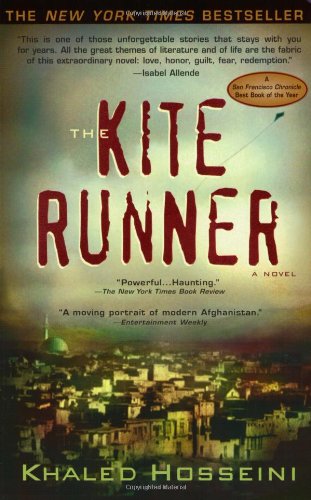All Nonfiction
- Bullying
- Books
- Academic
- Author Interviews
- Celebrity interviews
- College Articles
- College Essays
- Educator of the Year
- Heroes
- Interviews
- Memoir
- Personal Experience
- Sports
- Travel & Culture
All Opinions
- Bullying
- Current Events / Politics
- Discrimination
- Drugs / Alcohol / Smoking
- Entertainment / Celebrities
- Environment
- Love / Relationships
- Movies / Music / TV
- Pop Culture / Trends
- School / College
- Social Issues / Civics
- Spirituality / Religion
- Sports / Hobbies
All Hot Topics
- Bullying
- Community Service
- Environment
- Health
- Letters to the Editor
- Pride & Prejudice
- What Matters
- Back
Summer Guide
- Program Links
- Program Reviews
- Back
College Guide
- College Links
- College Reviews
- College Essays
- College Articles
- Back
The Kite Runner by Khaled Hosseini
Without question, the book that has most influenced me is The Kite Runner. The book is about the Middle East and provides insight on the lives’ of the people there. The story is based on many similar, true stories, but is unique in every aspect. This book influenced me by completely changing my view about the Middle East and its culture.
Written by Khaled Hosseini, the story is located in western Afghanistan and follows the life of a wealthy Pashtun family, the main ethnic group in Afghanistan, and their Hazara (large minority group) servant. The Pashtun boy, named Amir, befriends the son of the Hazara servant, Hassan. A violent older boy, Assef, reprimands Amir for associating with a Hazara, whom Assef deems an inferior race. Assef attacks Amir, but Hassan stands up for Amir, threatening to shoot Assef with a slingshot. Deeply moved by this event, Amir and Hassan soon become the closest of friends and the reader is guided through their happy days with them. I became very close to the boys, as I realized they were very much the same as me, both in age as in personality.
A few months later, there is a kite “cutting” tournament in the city, so Amir and Hassan enter the event. The objective of kite cutting is to cut down all the competitors’ kites, hence the name. In the Afghani culture, kite cutting was a great honor, and was only reserved for the wealthy. Amir wins, so Hassan runs to retrieve the last kite for him - the token of victory. As Hassan runs through the alleyways, he runs into Assef, giving Assef the opportunity to obtain his revenge on Hassan. Assef demands the kite, but Hassan refuses to let go of Amir’s prize, bravely standing up to the larger boy. Assef rapes Hassan just as Amir arrives, searching for Hassan. Amir is too scared to interfere and watches the whole scene silently.
Afterwards, there is a tense air between Amir and Hassan, as Amir is filled with shame at his cowardice, and Hassan, ever respectful, says nothing. Amir’s father, who Amir calls Baba, praises his son on his honorable victory, but Amir says nothing. Hassan’s father, Ali, senses something is wrong, and tries to leave with Hassan. Baba and Ali were childhood friends and remained close, prompting Baba to beg Ali to stay. Nevertheless, Ali and Hassan leave. That was the only night Baba cried in his life, and Amir watched guiltily, but did nothing.
Five years later, the Soviet Union invaded Afghanistan, and Amir and Baba are forced to flee to Pakistan. At a refugee camp, Amir meets a beautiful woman named Soroya, and they become in love. Unfortunately, Baba is diagnosed with cancer at the camp, but his final death wish is for Amir to marry Soroya. The two have a quiet marriage and move to the United States. Amir leads a pleasant life as a novelist, but Amir and Soroya find out they cannot have children.
One evening, Amir receives a call from his uncle, Rahim Kahn, telling him that, “There is a way to be good again.” Amir realizes his uncle knew about the incident with Hassan, because his uncle was very close to both boys. Amir returns to Afghanistan and finds out Hassan and his wife were murdered by the Taliban, who took over after defeating the Soviet Union. Rahim Kahn also informs Amir that Hassan was his half-brother; Baba was a father to them both. Amir finds Hassan’s son and after a series of events, including an attempted suicide by the boy, adopts him. “This is the way”, his uncle said, “to be good again.” Amir is finally free from his guilt as the story ends with Amir running a kite for the little boy, Sohrab.
Most people usually think of the Middle East as a dry, desolate desert, only housing people with tightly bundled turbans and camels, but our stereotypes are incorrect. The ethnic diversity shown in this book provides a large perspective, and then concentrates on a specific life. Each word in The Kite Runner is chosen carefully in order to relay the deep message, and Khaled Hosseini is a master at his art. “There are large numbers of people who simply don't have the values and vision necessary to be part of an inter-dependent world. They think their differences - whether religious, political, tribal or ethnic - are more important than our common humanity. They believe the truth they have justifies their imposition of that truth on other people, even if it takes them to the death of innocents.” - Bill Clinton
Similar Articles
JOIN THE DISCUSSION
This article has 1 comment.

